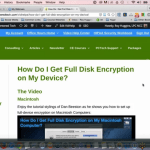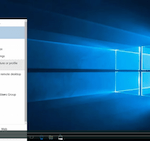by Roy Huggins | Dec 17, 2015

To get the most out of this Helper Video tour, watch the above excerpt from the December 17th, 2015 Office Hours session. Use These Helper Videos To Guide You In Encrypting Your Computer(s), Your USB Sticks and External Hard Drives, and Your Smartphone(s) How Do I Get Full Disk Encryption on My Device? This one […]
To access this content please click here to
log in
by Roy Huggins | Dec 17, 2015

The Video Windows 7 Enjoy the tutorial stylings of Dan Beeston as he shows you how to encrypt a USB drive or other external hard drive with BitLocker on Windows 7 Computers: Windows 8 Enjoy the tutorial stylings of Dan Beeston as he shows you how to encrypt a USB drive or other external hard […]
To access this content please click here to
log in
by Roy Huggins | Nov 29, 2015

What?: A firewall is a special program that “guards the gate” where your computer connects with the Internet (and possible other networks.) It looks for suspicious comings and goings and tries to stop things that look wrong. For example, if there is a piece of malware on your computer that is trying to communicate with a home base of hackers, your firewall would be the software that notices this suspicious activity and tries to put the kibosh on it. A firewall is an essential tool in the toolbelt for clinicians who need to protect sensitive information and apps from hackers, viruses and other such badness…
To access this content please click here to
log in
by Roy Huggins | Nov 29, 2015

What?: “Antivirus software” is a term with broad meaning. At the most basic, it signifies software that scans your device periodically to see if it has been infected with a virus. That is a very passive way of doing antivirus. More proactive software may perform actions like watching you surf the Internet and trying to prevent you from downloading viruses in the first place. This more proactive kind of software is often called “antimalware software.” Given the enormous amount of malware being employed by criminals and other well-organized bad guys in the world, it is clear why clinicians who use devices to handle sensitive information and apps need to protect those apps from malware…
To access this content please click here to
log in
by Roy Huggins | Nov 29, 2015

What?: Full-disk encryption is the strongest technical intervention for keeping out people who have physical access to your device. Hands down. Accept no substitutes. It is also possible for full-disk encryption to qualify you for an important safe harbor in the HIPAA Final Breach Notification Rule. In other words, full-disk encryption is so useful, it can even get you legal protection from reporting security breaches if your encrypted gear gets lost or stolen. It’s easy to see why we clinicians would want to use this technology in all our devices…
See Also: Digital Confidentiality Level II Syllabus
See Also: Our Article On Full-Disk Encryption and HIPAA
To access this content please click here to
log in
by Roy Huggins | Sep 14, 2015

What?: One of the strongest methods of protecting your information from confidentiality breaches is to encrypt it. “Full device encryption” is a kind of encryption dragnet that ensures that all the info on your device is encrypted regardless of whether you remember to encrypt it or not. This kind of encryption can also offer enhanced protection from liability under HIPAA…
See Also: HIPAA “Safe Harbor” For Your Computer
See Also Also: Digital Confidentiality Level II Course Syllabus
To access this content please click here to
log in
by Roy Huggins | Sep 14, 2015

What?: When we connect to websites, our devices send information across the Internet. This information is normally visible to all and sundry who are in a position to observe the flow of your information. To deal with this, websites are able to offer a special kind of connection that encrypts your information while it is being sent across the Internet. If you are accessing Web pages that handle protected health information, you can see the value of this…
See Also: Digital Confidentiality Level I Syllabus
See Also: Is Gmail Encrypted?
To access this content please click here to
log in
by Roy Huggins | Sep 13, 2015

What?: Wi-Fi networks are near-ubiquitous and can also be a significant source of vulnerability for protected health information that is either on computers using the Wi-Fi network or uploaded and downloaded using the Wi-FI network. There is a way to make Wi-Fi more reliable, however, and it is essential that clinicians who use Wi-Fi with equipment that touches protected health information know which Wi-Fi networks they can safely use and which ones they can’t.
To access this content please click here to
log in



